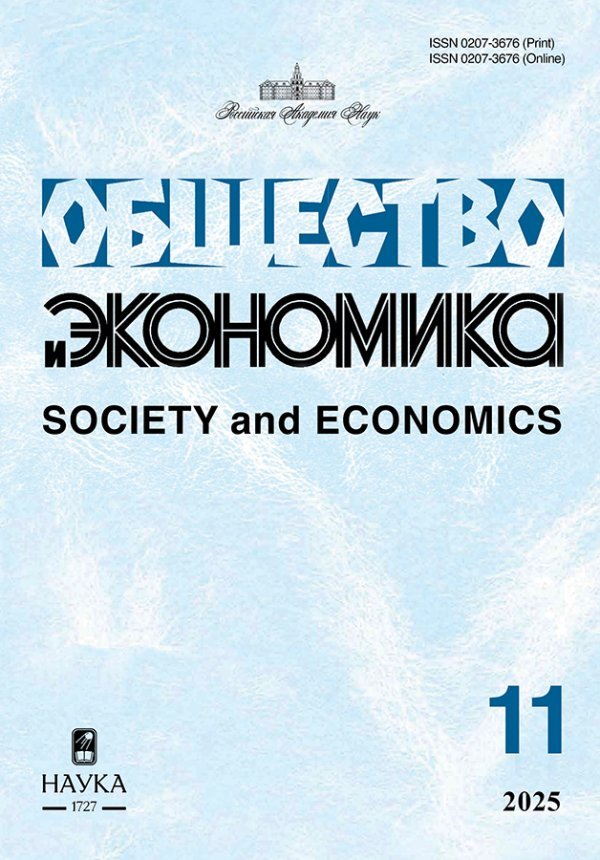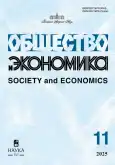Society and Economics
ISSN (print): 0207-3676
Media registration certificate: No. 0110199 dated 05/05/1999
Founder: Russian Academy of Sciences
Editor-in-Chief: Kokhno Pavel Antonovich
Number of issues per year: 12
Indexation: RISC, list of Higher Attestation Commissions, CrossRef
The journal "Society and Economics" was established on the initiative of the Russian Academy of Sciences and in accordance with the decree of the Council of the International Association of Academies of Sciences (Decree of the Council of IAAS No. 37 of November 17, 1995).
The presidents of the member academies of the International Association of Academies of Sciences (IAAS) issued a Memorandum of Association for the publication of the journal “Society and Economy” as an international journal and signed the Charter of the journal. From the pages of the journal, the presidents of Armenia, Belarus, Vietnam, Georgia, Kyrgyzstan, Moldova, Russia, Ukraine, the Prime Minister of the State Council of the People’s Republic of China, and the Prime Minister of Armenia addressed the readers in different years. Representatives of the academies of sciences of Azerbaijan, Armenia, Belarus, Georgia, Kazakhstan, Kyrgyzstan, Moldova, Russia, Tajikistan, Turkmenistan, Uzbekistan, Ukraine, as well as the National Center for Social and Human Sciences of the Socialist Republic of Vietnam were delegated to the editorial board of the journal.
In accordance with the Charter of the journal, in addition to publishing the journal, its international editorial board and the editorial team of the journal, with the active participation of scientists from the CIS countries, carry out research, as well as scientific and organizational work on the publication of monographs of international authors' teams (a total of 5 such monographs have been published, and international scientific conferences have been held).
The journal contributes to the development of multilateral scientific ties between scientists, including those working in the CIS countries, which has a positive impact on the formation of mutual understanding, and allows the exchange of practical experience of socio-economic development. Besides an international journal of historical studies, this is the only international journal of the CIS countries, dedicated to social issues.
The journal “Society and Economy” welcomes innovative approaches that are debatable in nature, providing an opportunity for famous scientists and young specialists to report on:
- economic models in the modern world;
- methods of stabilizing the economy in a crisis;
- problems of balance in the economy;
- modern concepts of economic growth;
- problems of the political organization of society in post-socialist countries.
Current Issue
No 11 (2025)
THEORETICAL ECONOMICS
Goals and interest of the state in the activities of the state-owned companies: what does the expert data say?
Abstract
The article examines established and new conceptual approaches to assessing the role and functions of the state in a market economy, examines the prerequisites for the transformation of forms of economic intervention by the state, and the development of the institution of state joint-stock ownership in the context of global technological and economic challenges. The duality of interests of the state as a shareholder/owner is revealed, and a special emphasis is placed on using an interdisciplinary approach to analyzing the goals and objectives of state-owned enterprises (SOEs) in Russian economy. Based on the generalization of the results obtained in the framework of the conducted sociological research, the authors have identified the dominant approaches in the Russian expert community to determining the interests of the state, regulating priorities and goals for the development of SOEs.
 5-16
5-16


The Strategy for the Development of the Pharmaceutical Industry of the Russian Federation for the Period up to 2030: Growth or Stagnation?
Abstract
The article analyzes the Strategy for the Development of the Pharmaceutical Industry of the Russian Federation until 2030 in the context of continuity with the previous strategy (until 2020) and new sanctions realities after 2022. The seriousness of such a challenge to the provision of medicines to Russian citizens as a possible failure to supply the latest innovative drugs to our country is substantiated. The reason for the possible failure is the termination of clinical trials of new drugs in Russia by the world’s largest pharmaceutical manufacturers. The author argues that even the basic version of the Strategy, judging by its target indicators, is not sufficiently focused on the dynamic development of the domestic pharmaceutical industry. Rather, we can talk about stagnation of the industry, and not about its development. Nevertheless, as shown in the article, the pharmaceutical industry of Russia has a chance to avoid stagnation thanks to investments.
 17-31
17-31


THE NATIONAL PROJECT OF TECHNOLOGICAL LEADERSHIP AS A TOOL FOR THE DEVELOPMENT OF DOMESTIC MACHINE TOOL INDUSTRY
Abstract
With the adoption in 2024 of the updated list of national development goals in the strategic planning system, the targets for the development of the domestic machine tool industry changed, and the implementation of the national project “Means of Production and Automation” aimed at achieving them was launched. The article characterizes the composition of this national project, and analyzes the key areas of activities forming the federal project «Development of the production of the machine tool industry» included in it. It is concluded that the planned measures are comprehensive and are the largest in the last thirty years among implemented in Russian machine tool industry. It is emphasized that their implementation takes place in the absence of an up-to-date sectoral development strategy designed to identify the most effective mechanisms for achieving the set development goals. Proposals and recommendations regarding the improvement of the policy of development of the domestic machine tool industry are formulated.
 32-47
32-47


DIRECTIONS FOR REFORMING THE RUSSIAN IMMIGRATION MODEL: TECHNOLOGICAL AND INSTITUTIONAL ASPECTS
Abstract
The paper systematizes the concepts of technological and institutional directions of reforming the immigration model of modern Russia, which are defined by two main trends in its development. The first is the expansion of cheap labor, and the second is the transformation of labor migration into social (civil) migration that is no longer related to labor. In the sectoral aspect, the author provides an analysis of the current state of the technical and technological base, the improvement of which (robotization of logistics and trade, unmanned vehicles, metal structures and modules in construction) will allow for the replacement of expensive human resources from among national personnel and radically reduce the need for cheap labor from migrants from poor countries in the CIS. The transition from a liberal immigration model to a strict one must be ensured by new institutions (transition to short-term labor relations, a ban on family migration, and selective partial naturalization of new citizens).
 48-62
48-62


SOCIAL ISSUES
HAVING MANY CHILDREN AS A FACTOR OF DIFFERENCES IN THE PERCEPTION BETWEEN LARGE AND SMALL FAMILIES
Abstract
The article analyzes the influence of the factor of having many children on the families’ subjective assessment of their housing conditions and financial situation. The survey data using Welch’s t-test and multiple regression analysis reveals that the differences between large and small families are statistically insignificant (p > 0.05), although large families, especially women, have slightly lower average values. Barriers to childbearing differ by family type and gender: economic and social factors predominate in families with few children, while age and health factors predominate in families with many children. The findings emphasize the need for differentiated measures of demographic policy and family support.
 63-77
63-77


ASSESSMENT OF THE FACTORS AFFECTING INCENTIVES AND EXPENDITURE ON MEDICINES
Abstract
The author evaluates the factors influencing household spending on medicines. The determinants of the probability of incurring expenses are estimated using a logit model. Separately, regional models with fixed effects are also built to identify factors influencing the amount of expenses. As a result, the significant factors are revealed, such as multimorbidity, smoking, the presence of children and pensioners, residence in a rural area or in an urban-type settlement, higher education, the size of the household, and some factors of professional activity. Some existing measures are considered, and measures to reduce the financial burden on the population are proposed.
 78-99
78-99


WORLD ECONOMY
FORMATION OF AN INTEGRATED INFORMATION SYSTEM OF THE EAEU TAKING INTO ACCOUNT THE TECHNOLOGICAL GAP BETWEEN THE MEMBER COUNTRIES
Abstract
The study is devoted to the analysis of the development of the integrated information system of the EAEU in the context of the formation of a common digital space of the participating countries. The purpose of the work is to analyze the specifics of the development of the integrated information system (IIS) of the EAEU against the background of the development of digital platforms and the formation of a cross-border “space of trust” between the participating countries. The paper shows the specifics of the development of digital platforms of the EAEU and compares it with the development of the ecosystem of digital platforms of the European Union, reveals the main reasons that prevent the connection of the EAEU countries to the IIS of the EAEU. It also considers promising areas for the development of common processes within the IIS of the EAEU in the context of the digital transformation of the national economies of the EAEU member countries.
 100-122
100-122


SOME SPECIFIC FEATURES OF THE IMPLEMENTATION OF DIGITAL FINANCIAL TECHNOLOGIES IN TAJIKISTAN’S BANKING (USING ALIF BANK AS AN EXAMPLE)
Abstract
The article is devoted to the analysis of the prospects for the introduction of new digital technologies in the financial sector in order to improve the efficiency of the banking sector in Tajikistan. The focus of the study is on the work of the Tajik Alif Bank in order to identify the features of the ongoing digital transformation processes, possible advantages and risks. Its competitiveness within the national banking system is analyzed. The principles of Alif Bank’s work to attract the target audience using digital products are studied. The services of Alif Holding and its prospects in the development of Islamic fintech in the CIS countries are considered. An analysis of the features of its entry into the CIS banking market and the introduction of Islamic banking is carried out. Based on the collected data, the article attempts to show the features of the digitalization of banks in Tajikistan and highlight the possible advantages and risks.
 123-135
123-135













